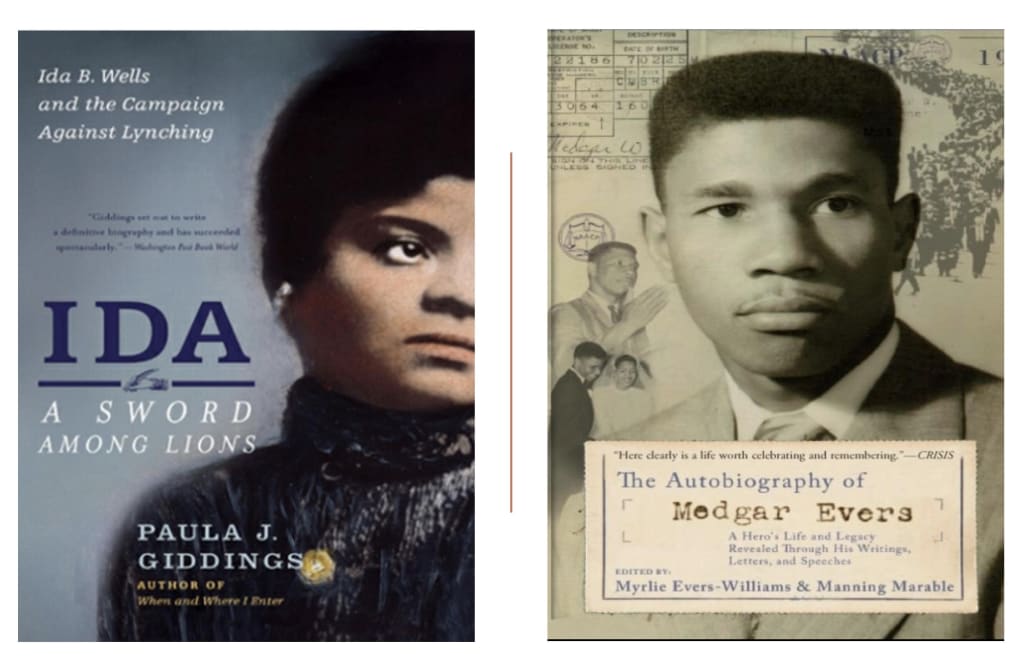Celebrating Ida B. Wells & Medgar Evers: The Heroine and Hero of Black America
The Anti-Lynching Crusader Ida B. Wells and Servant Leader Medgar Evers

Ida B. Wells was an African American journalist, activist, abolitionist, and feminist who led an anti-lynching crusade in the United States of America in the 1890s. She went on to found and become integral in groups striving for African American justice and freedom. Wells also established several civil rights organizations. For example, in 1896, she formed the National Association of Colored Women, and she is also considered a founding member of the National Association for the Advancement of Colored People (NAACP). Ida B. Wells wrote about issues of race and politics in the south of the U.S. Several of her articles were published in Black newspapers and periodicals under the moniker “Iola.” Wells eventually became an owner of the Memphis Free Speech and Headlight, and later, of the Free Speech.
African American Medgar Evers was an integral part of the civil rights movement in the U.S. that began before the media exposed America to the struggle of those who had embedded into their very being the hunger for justice and equality. He was a freedom fighter who possessed raw courage and bravery, even though he was aware there could be the ultimate price to pay, including the loss of his life. Medgar Evers did not seek recognition or glory. He represented the “salt-of-the-earth,” moving through fear and placing all possessions, home, family, jobs, on the sacrificial plate of freedom. When Medgar Evers’ wife, Myrile Evers-Williams raised the issue of her husband seeking credit for his work, in a firm voice, Medgar Evers said:
“It’s not about me, it’s about the mission and the little people.”

Ida B. Wells was born July of 1862 in Holly Springs, Mississippi, just three years before slavery was abolished in 1865 in the U.S. She was the first of eight children, although one died after childbirth. Her parents, James and Elizabeth Wells were enslaved people at the time of her birth, and during her formative years they had made a remarkable transition as freepersons. At just 16-years-old, a turning point occurred in Wells’ life when both of her parents, and her nine-month-old brother Stanley died when the yellow fever epidemic had swept across the Mississippi Valley. Instead of breaking up the family, Wells insisted that she could take care of all her siblings. People “scoffed” at the idea that a petite teenager, still in school herself can become independent and be the head of her household. She held firm and accomplished what she put her mind to and took care of her siblings.
Wells eventually left Holy Springs deeply marked by grief and anger rooted in her abandonment, from the loss of her parents, and later the community. Never successfully repressing her emotions, for the remainder of her life, Wells struggled to reforge them into a cast that transformed her sense of personal injustice into a wider activism, which took on the intensity of a crusade that sought to restore the integrity of not only her own person but that of African American women and the Black race of which she belonged.
One of the most important developments in Ida B. Wells’ life was when she was approached by Taylor Nightingale, a pastor of the historic Beale Street Church. He asked Wells to become the editor of the Memphis Free Speech & Headlight. Wells was thrilled by the offer, but she told Nightingale she would join the paper as editor if she were made equal partner with him and J.L. Fleming, the business manager. Nightingale accepted Wells’ terms, making Ida B. Wells the only Black woman of record to be an editor in chief and part owner of a major city newspaper.
Besides addressing different aspects of lynchings that African Americans were experiencing in the U.S. Wells also traveled abroad and provided her readers with pointed history lessons. For example, in Great Britian (United Kingdom), she recounted how Liverpool, known as the “Gateway to the British Empire,” had swollen in wealth from the Transatlantic slave trade. Wells also pointed out how Liverpool, with its expansive cotton market, had built more than “half the slave ships” slated for the Middle Passage. She also recounted the story of Liverpool’s most famous native son, William E. Gladstone, Liberal Party leader and Great Britian’s prime minister (mostly from 1892 to 1894), belonged to a family whose wealth came from the slave trade.
“It was her special mission to interpret and express the wrongs and sufferings of an oppressed race. She knew how white publicists & statesmen had denied [the] Negro’s courage & valor & how white historians had sustained the denial. She was a profound student of sociology. She not only knew the white race, but she knew her own…. She knew that there were many who were doubtful of the natural equality of their race; that many were ashamed…. She knew that only a few people knew the Negro’s part in world history and culture and there is a destiny [to] complete freedom & emancipation.” – Activist Irene McCoy Gaines
Ida B. Wells died of kidney disease on March 25, 1931, at the age of 98-years-old, in Chicago, Illinois. She left behind an impressive legacy of social and political heroinism. With her brilliant writings, speeches and protests, Ida B. Wells fought against prejudice, no matter what potential dangers she faced.

The origin story of Medgar Wiley Evers started when he was born on July 2, 1925, in Decatur, Mississippi, USA. He was the child of James and Jesse Evers. The Evers family was never well-to-do, yet they managed to acquire land and a modest degree of security. James Evers was frequently called “Crazy Jim” by local whites, partially because he adamantly refused to step off the sidewalk in deference to whites as they passed.
James Evers would also constantly preach to his children:
“My family will be able to walk on the sidewalk. [Whites] will treat them with dignity. They will be able to register to vote.”
The senior Evers emphasized that Black people should never be apologetic or ashamed of who they were as Black people, and they should never attempt to negate or deny their Black-African heritage and culture. These were the lessons that affected Medgar Evers and formed the foundations of his core personal and emerging political identity. Medgar Evers is a servant leader, which is a model of civic engagement that seeks to inspire change through personal examples of sacrifice. The servant leader achieves goals of change by transforming how oppressed people perceive themselves, awakening the sense that by and through their own energies and actions they have the capacity to both resist oppression and achieve meaningful results.
“My people, my people. Will they ever be ready? Yes, yes, we will be ready!” – Medgar Evers
Medgar Evers was dedicated to face racist intimidation and violence, which made it possible for millions of Americans to achieve their constitutional rights. Through Evers’ own voice and words, in memoranda, telegram messages, personal notes, transcribed public speeches, and fragments of written texts, one will notice the true dignity and dedication of Medgar Evers. He personally rejected the limelight, modestly preferring that others bask in public recognition while he labored on the sidelines on behalf of African American people; the branch of humanity of which he belonged. According to Supreme Court Justice Thurgood Marshall, most people who had encountered Evers didn’t “think that Medgar had any gumption (i.e., courage) at all. And that’s how he got so much accomplished. People underplayed him. He had more courage than anybody I’ve ever run across.”
Unlike Dr. Martin Luther King Jr, Medgar Evers was not an advocate of “nonviolence” in the face of white terrorism. He purchased a rifle, and over the next years carried it with him in his car just in case he had to protect himself and his family.
A few minutes after midnight, on June 12, 1963, Medgar Evers drove his car into his driveway. The carport light overhead was on; Medgar left the car from the driver’s side and retrieved some T-shirts that read, “Jim Crow Must Go!” Across the street white supremacist Byron De La Beckwith took aim with a rifle and shot Medgar Evers. The shot that struck Evers awoke the entire neighborhood, and only hours later, it shocked the nation of the U.S.
Medgar Evers was officially pronounced dead at the University of Mississippi Medical Center at 1:14 am on June 12, 1963. He was only 37-years-old. The assassination of Medgar Evers was the first political assassination of a major leader of the modern Black Freedom Movement. In death, Medgar Evers had become “a hero not only for Mississippi but also to the entire nation.”
“Our youth today are more in need than ever for excellent role models, for examples of strong, unselfish leadership. They must be able to make the link between the past, the present, and their future.” - Myrile Evers-Williams

Sources:
Biography.com Editors. Ida b. Wells Biography. A&E; Television Networks. Jan. 6, 2021. June 10, 2023. https://www.biography.com/authors-writers/ida-b-wells
Evers-Williams, M. Marable, M. The Autobiography of Medgar Evers: A Hero’s Life and Legacy Through His Writings, Lectures, and Speeches. Civitas Books. (Aug. 29, 2006). June 10, 2023. Location: Cover, 122, 138, 148, 165, 171, 203, 238, 294, 303, 333, 342, 351, 457, 4204, 4213, 4672, 4690.
Giddings, P. Ida: A Sword Among Lions: Ida B. Wells and the Campaign Against Lynching. HarperCollins e-books; Reprint edition. (Feb. 20, 2009). June 10, 2023. p. Cover, 10, 14, 154-155, 289, 311, 645, 658, 660.
Hernandez, A. Black History Art Series. Adam Hernandez. Tumblr. June 10, 2023. https://blackhistoryseries.tumblr.com/post/17209964669/medgar-evers-blackhistorymonth-tribute-drawing/amp
Print Vectors. Peace Love Juneteenth Svg, Black Freedom 1865 Svg, Black Lives Matter Svg, Juneteenth T Svg, Juneteenth Gift Svg cameo cricut file. Print Vectors. June 14, 2023. https://theprintvectors.net/products/peace-love-juneteenth-svg-black-freedom-1865-svg-black-lives-matter-svg-juneteenth-t-svg-juneteenth-gift-svg-cameo-cricut-file
About the Creator
Darryl C. Richie
Inspirational Speaker, Author and Blogger looking to inspire with my story of being a two-time cancer survivor and hip amputee, and connect the African Diaspora to their African roots via Black Consciousness.






Comments
There are no comments for this story
Be the first to respond and start the conversation.